General
Scholarly Book launched to immortalize Prof. James Patrick Manyenye Ntozi
Published
9 years agoon
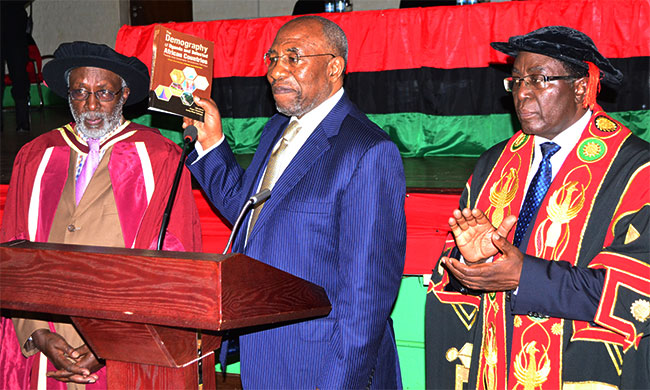
Scholars from the field of Demography and Population Studies have written a scholarly tribute to Prof. James Patrick Manyenye Ntozi; celebrating his 45 years of dedicated and distinguished service in the field of demography at Makerere University, Uganda, Africa and beyond.
The book titled: Demography of Uganda and Selected African Countries: Towards more Sustainable Development Pathways was officially launched by the Prime Minister of the Republic of Uganda Rt. Hon. Dr. Ruhakana Rugunda at a high profile ceremony that was organized by Makerere University College of Business and Management Sciences (CoBAMS) and the Centre for Population and Applied Statistics (CPAS).
Edited by Prof. John Oucho, Dr. Gideon Rutaremwa and Prof. Jockey Baker Nyakaana, the book will immortalize Professor Ntozi’s work and inspire other demographers and their colleagues elsewhere to undertake a similar exercise for their deserving mentors. “We hope readers will find this book a fitting accolade to a man who dedicated his life to scholarship in demography and through which his students and compatriots alike have laid strong foundation for immortalizing the scholar.”
Speaking to the congregation in the Makerere University Main Hall on 23rd March 2017, Rt. Hon. Dr. Ruhakana Rugunda commended Prof. James Manyenye Ntozi for being a strong fighter with a dedicated spirit in liberating his country from poverty. According to Rt. Hon. Rugunda, Prof. Manyenye Ntozi is a unique and outstanding personality whose works have shaped the field of demography in Makerere University, the nation and indeed the continent.
“I congratulate you on this great achievement. I would like to say that your distinguished contribution to the scholarly world and your excellence in the field of Demography and Population Studies has inspired many people around the globe. I am happy to say that you will always be remembered as a famous person that has taught, mentored and nurtured many people on this continent,” the Prime Minister said.
The Prime Minister appreciated Makerere University’s efforts to recognize distinguished academicians and called upon other institutions to emulate Makerere University so that academicians receive the recognition they deserve. He shared concern on the policy of retiring professors, and advised Makerere University Management to engage the concerned Ministries so that the University continues to benefit from the treasure within professors perpetually.
Speaking about the book, the Prime Minister said, “This book is very relevant and specifically talks about the needs of our country Uganda. I therefore thank the authors who contributed articles to this book. I also thank the editors for the wonderful job well done.”
Makerere University Vice Chancellor Prof. John Ddumba-Ssentamu acknowledged Prof. Manyenye Ntozi’s efforts in promoting Makerere University locally and globally through his tremendous achievements in Demography and Population Studies. According to Prof. John Ddumba-Ssentamu, Prof. Manyenye Ntozi has diligently served Makerere University in various capacities.
“Prof. Manyenye Ntozi has served as a Lecturer, Head of Department, Dean, Member of Senate and Ambassador of the University to the outside world. His unique skills and knowledge in the field of demography, acquired over a period of more than four decades of scholarly work, have been utilized in the world over. This is evidenced by his various appointments to Boards of organizations and parastatals, as well as international engagements as Visiting Scholar and Researcher,” he said.
Prof. Ddumba-Ssentamu congratulated Prof. Manyenye Ntozi upon being recognized through a scholarly tribute that presents him as a brilliant academician with remarkable scholarly services in the field of Population studies.
“There is truly no greater achievement for an academician than to be recognized by not only your peers but your students as well. Congratulations! The book has been put together by Prof. Ntozi’s compatriots and students across the African continent. It is, therefore, a product of highly organized collaborative effort, achieved with professional support of the Fountain Publishers,” said the Vice Chancellor.
In his keynote address titled Old is Gold; Harnessing Academicians in old Age, John Oucho a Professor of Demography and Geography at the University of Nairobi said that there is a need to respect and fully utilize knowledge and advice of old people. Defining the two terms, Prof. Oucho stated that Old is that experience a person has gained over the years and gold is one of the expensive metals in the metal industry.
Professor Oucho said that the experience that old people like Prof. Ntozi have, is as expensive as gold because they have taken many years to learn the lessons of life as well as accumulating a wealth of experience. “Therefore don't disrespect or neglect them because they are old but do take care of them as precious gold,” he said.
Citing a verse from the book of Exodus, Prof. Oucho encouraged the young generation to respect and show love to the old people since they are a source of knowledge and inspiration to them. “Exodus 20:12 says; “Honor your father, your mother that your days may be prolonged in the land which the LORD your God gives you”. We academicians we are like fathers of our students. Therefore you should respect us through giving us time, listening to us, being polite to us and asking for our advice. We must strive to have a society for all ages including the old and retirees. Discriminating against old academicians is like discriminating your own parents,” he said.
In the spirit of harnessing academicians in old age, Prof. Oucho appealed to Makerere University to appoint Prof. James Patrick Manyenye Ntozi-Professor Emeritus.
James Patrick Manyenye Ntozi is a Professor of Population Studies at Makerere University. He is a Medical Demographer and Statistician by training whose distinguished experience is well observed in conducting evaluation, needs assessment and baseline studies at international and national levels. His most recent monitoring and evaluation work included evaluating the PEPFAR project in Nigeria for the USA National Academy of Sciences and Congress (2005 – 2007).
Introducing him, as a great scholar, the Minister of Tourism, Wildlife and Antiquities Prof. Ephraim Kamuntu said Prof. Ntozi’s legacy will live on through his works, scholarship and mentorship. He described Ntozi as a faithful and lovable person, very consistent and focused.
“I have known Ntozi since 1960, he is a dedicated fighter. He is a father who has managed to devote considerable amount of time to bring up his children. Ntozi is an excellent husband to Aidah Ntozi,” he passionately said.
The book titled, Demography of Uganda and Selected African Countries: Towards more Sustainable Development Pathways is a climax of an idea by Prof. Ntozi’s peers and students who thought of writing a paper to recognize their lecturer. When the staff in the Department of Population Studies committed themselves to writing a book, the idea of writing a journal article metamorphosed into a book that would forever immortalize Prof. Manyenye Ntozi.
According to Dr. Abel Nzabona, one of Prof. Ntozi’s students and writer of the book, Prof. Ntozi is Uganda’s most illustrious population demographer. He will always be remembered for establishing the Department of Population Studies at Makerere University; attracting funding to support national and international programmes in the field of population studies and demography; and his track record in scholarship, mentorship and career guidance. He applauded Prof. Ntozi for over 75 papers published in peer reviewed journals.
Highlighting the book writing process, Dr. Nzabona said 15 writers and 4 editors from countries namely Uganda, Tanzania, Kenya, Nigeria, France and organizations including, Uganda National Bureau of Standards provided tremendous contributions to the book. He paid special tribute to all authors of the 16 Chapters who produced the material that builds the book. One of the Editors, Dr. Gideon Rutaremwa shared with the audience a brief on the book composition and contents.
It was a nostalgic moment when Prof. Ntozi clad in his academic regalia shared special moments regarding his student life at Makerere University.
“I joined Makerere University in June 1968 as an undergraduate student pursuing Bachelor of Science (Economics and Statistics)-Institute of Statistics and Applied Economics and I completed in March 1971. I registered for my Masters in the same Institute in September 1971 and completed in July 1973. I completed a PhD in Medical Demography in 1977. Because of the political turbulence during the Idi Amin Regime, I stayed in the University of Nairobi for two years. I returned to Makerere University in 1979, and since then, I have remained here despite many temptations in form of greener pastures at regional and international levels. I made a decision to stay at Makerere University to serve my alma mater and my country-Uganda. I did not abandon Makerere University.”
Prof. Ntozi also applauded Prof. Livingstone S. Luboobi, former Vice Chancellor of Makerere University, who was part of the audience for choosing to stay at Makerere University.
During his stay at Makerere University, Prof. Ntozi significantly contributed to the evolution of demography and population studies including mobilization of resources from bodies such as Rockefeller Foundation, World Bank, IDRC and National Population Council among others.
Prof. Ntozi expressed gratitude to his students and the authors for recognizing his contribution to the academia while he is still alive. He thanked the contributors for the scholarly tribute that will forever preserve his legendary work as Uganda’s most illustrious medical Geographer.
“I take this opportunity to appreciate all these efforts. In a special way, I thank Associate Professor Gideon Rutaremwa for spearheading efforts to publish this book. I also thank Prof. John Oucho, from the University of Nairobi for successfully accomplishing the task of Chief Editor of the publication and my wonderful students; I am more delighted to know that my students whom I trained and taught have vividly participated in putting together this piece of scholarly work,” he said.
Prof. Ntozi commended Dr. Fredrick Tumwine, Dr. Abel Nzabona and Mr. John Mushomi for working tirelessly to produce a piece of work that their teacher can proudly identify with. He thanked the College of Business and Management Sciences under the leadership of Dr. Eria Hisali for providing all the support required by the Centre for Population and Applied Statistics (CPAS) to publish the book.
He equally acknowledged the efforts of the Centre for Population and Applied Statistics (CPAS) under the able leadership of Mrs. Ssekiboobo Agnes for successfully hosting this publication process of the book. He also thanked Makerere University and the Government of Uganda for providing an environment that is conducive for scholars to freely write and publish their work.
According to Prof. Ntozi, his recognition will set the precedent at Makerere that more scholars/academicians ought to be recognized for the precious time devoted to the University. He was happy for his tremendous contribution and achievements in the university when he said, “I am happy that I have diligently served Makerere University with passion. I am sure that I will fulfill my decision to stay in my Alma Mater and my country Uganda as long as my life is not in immediate danger,” said James Ntozi.
Prof. James Patrick Manyenye Ntozi received a plaque from Uganda Bureau of Statistics presented by the Executive Director, Mr. Ben Paul Mungyereza in recognition of Prof. Ntozi's outstanding work at Makerere University and invaluable support to Uganda Bureau of Statistics. The plaque was presented to him by the Prime Minister Rt. Hon. Ruhakana Rugunda.
Dr. Fredrick Ruguma Tumwine who was supervised by Prof. Ntozi both at Masters’ and PhD, praised Prof. Ntozi for changing him from a physical into a human geographer. Representing students taught by the Professor, the overjoyed Tumwine said that Prof. Ntozi will never fade from the minds of his students, owing to the unique and fatherly character he always exuded. “He has always been good at time management and perfect in the way he articulates points. He is a superb supervisor,” he said.
Giving a vote of thanks, the Dean-School of Statistics and Planning, Dr. Robert Wamala thanked the Government, Makerere University, the family of Prof. Ntozi, authors and students for their contribution towards the process of honouring Prof. Ntozi.
The students from the Department of Performing Arts and Film together with the Head of Department Dr. Sylvia Antonia Nannyonga-Tamusuza treated guests to energetic performances including special presentations depicting the academic journey of Professor James Patrick Manyenye Ntozi.
Article by Mak Public Relations Office
You may like
General
Makerere Explores Strategic Industry Partnership with Psalms Food Industries to Strengthen Manufacturing Innovation
Published
11 hours agoon
March 4, 2026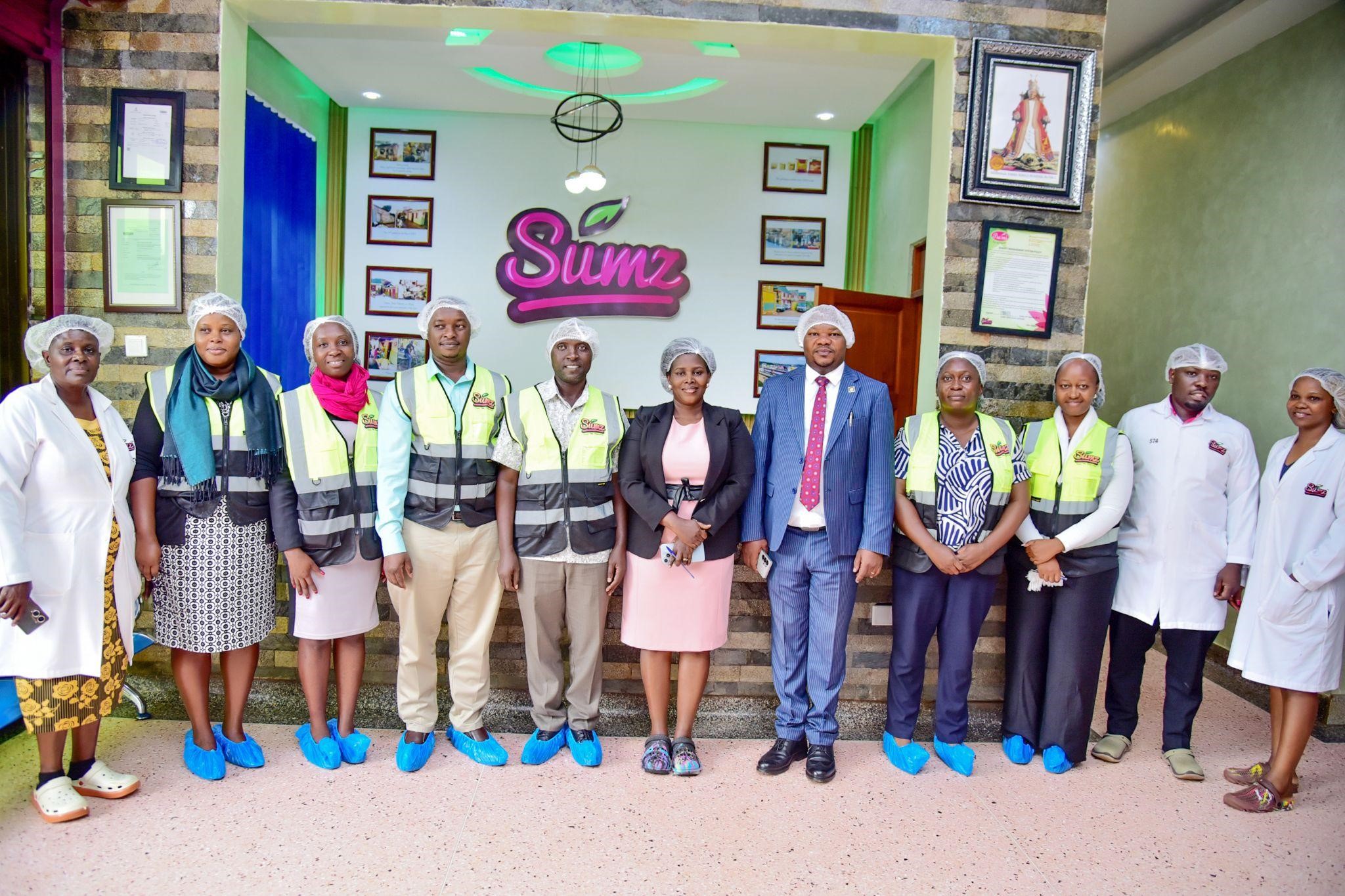
On 2nd March, 2026, representatives from the Advancement Office, the College of Business and Management Sciences and the University Innovation Pod visited Psalms Food Industries to discuss a prospective partnership aimed at strengthening university–industry collaboration in manufacturing, research, innovation, and skills development.
Psalms Food Industries, a homegrown snacks innovation and manufacturing company, operates three major brands, namely, Sumz, Afrikan Harvest and Krunchables, which have grown to a range of 37 products and target the introduction of five new products annually. The company distributes products across Kenya, Rwanda, the Democratic Republic of Congo, South Sudan, and, recently, Tanzania. As a labour of love, the idea of producing snacks was born during the honeymoon of Mr and Mrs Ngabirano, who now run Psalms Food Industries side by side.
Dr. Denis Ngabirano, CEO and Co-Founder of Psalms Food Industries, during the meeting, described the company as “a snacks innovation house, with all our products developed in-house.” He noted.
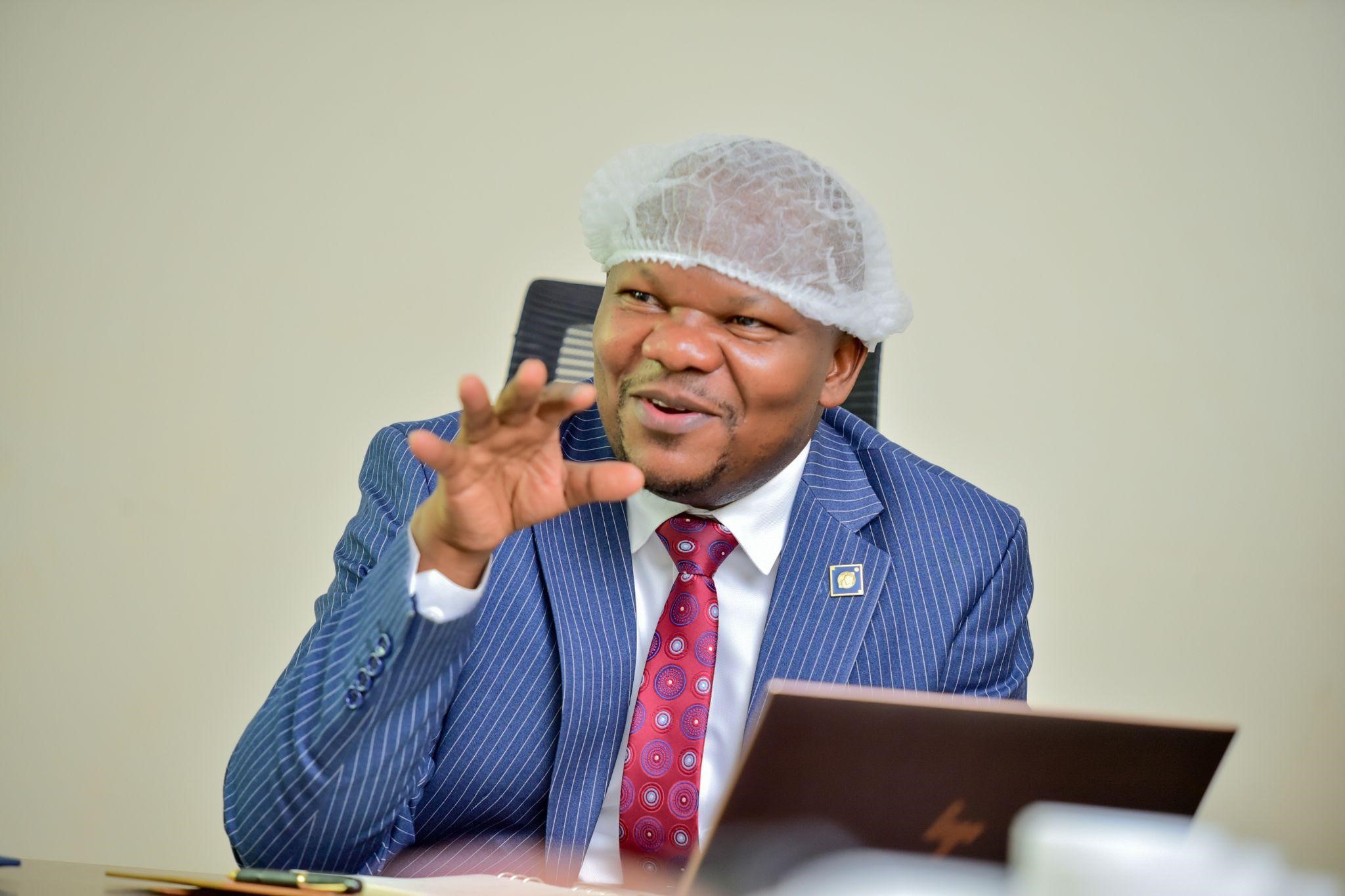
He emphasised the company’s commitment to quality assurance and consumer-centred research, noting that Psalms conducts surveys and gathers customer feedback to inform product development, supported by an internal microbiology and chemistry laboratory.
Dr. Denis Ngabirano noted that the company had only recently introduced two brands, “Afrikan Harvest for it’s health conscious clientele and Kruchables for it’s volume centric clientele.
“Afrikan Harvest has no additives, it is a brand for health-focused consumers,” he explained, while highlighting the differentiated positioning of their product lines. “Sumz is our premium brand, and Krunchables focuses on volume.”
Student-Centered Experiential Learning
A key focus of the meeting was structured experiential learning for students across disciplines. Potential areas of collaboration include internships, graduate trainee pathways, and hands-on exposure within Psalms’ incubation and production facilities.
The proposed engagement spans multiple fields, including environmental sciences, engineering, procurement and logistics, finance and accounting, quality control, production and manufacturing, human resource management, marketing, and international business.
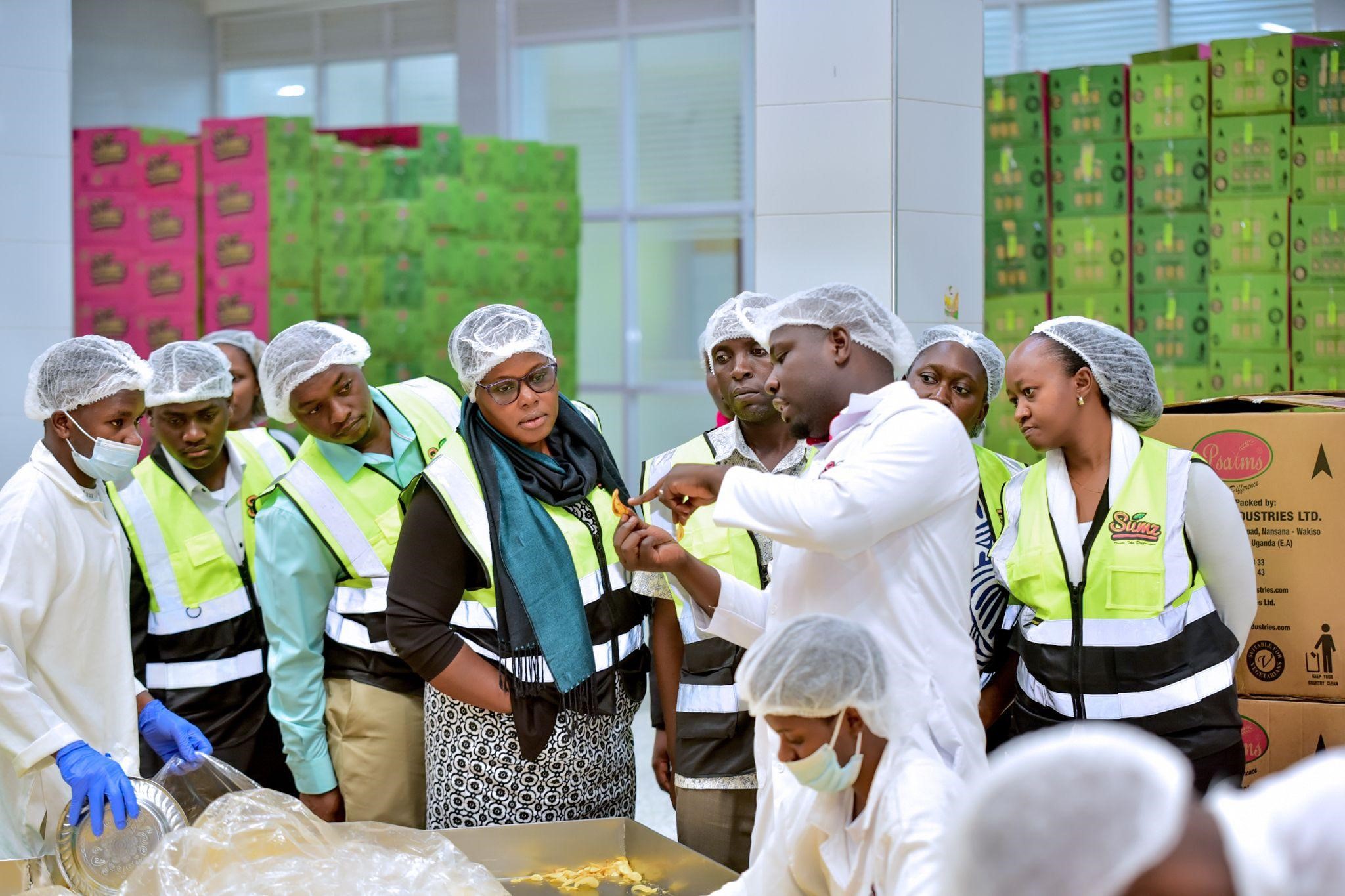
The partnership could provide students with direct exposure to real-time production systems, standard operating procedures (SOPs), and quality assurance frameworks, strengthening the practical relevance of their academic training.
Among the innovative ideas discussed was a potential competition involving students from the Fine Art and Industrial Design disciplines to redesign packaging for selected Sumz products. The proposal would allow top designs to be commercially adopted, creating a direct bridge between creativity, intellectual property development, and industrial application.
Research, Innovation and Commercialisation
Both institutions expressed interest in joint applied research initiatives, particularly in process optimisation, data analytics for manufacturing efficiency, product improvement, and sustainable production systems.
Opportunities were also discussed around collaborative research in machine design, crop development for snack processing, and factory energy solutions, areas that not only benefit Psalms but have broader implications for Uganda’s manufacturing sector.
The engagement further highlighted potential linkages with the University’s innovation and commercialisation structures, including the University Innovation Pod (UNIPOD), to support co-creation and scaling of student-led innovations.
Mr Awel Uwihanganye, Chief Advancement Officer at Makerere University, proposed strengthening the engagement through structured programming, including a planned collaboration between the University’s innovation Hub and the upcoming incubation Hub at Psalms Food Industries, particularly to support the commercialisation of research outcomes for both students and staff.
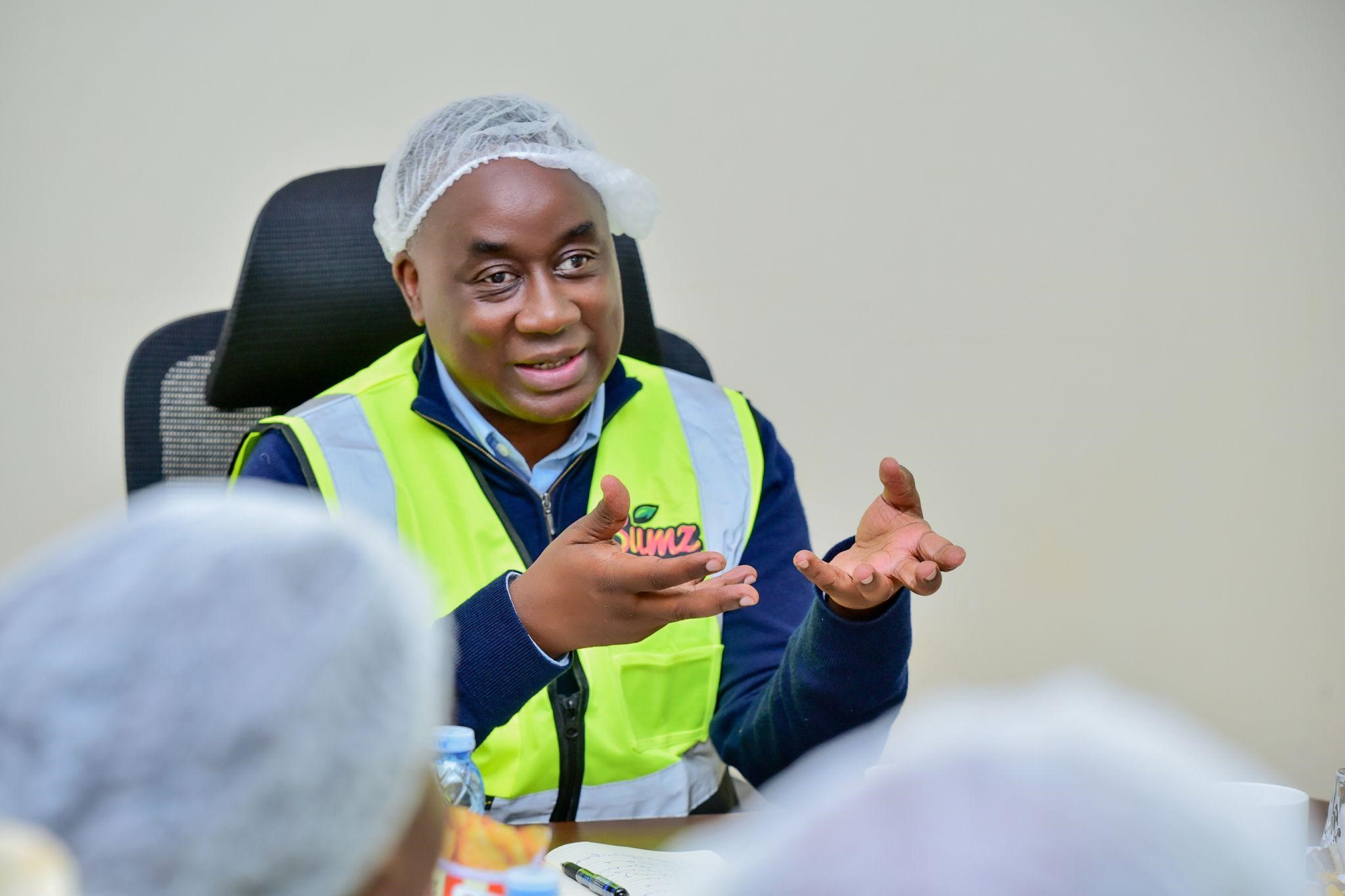
Curriculum Co-Creation and Staff Exchange
Beyond student placements, discussions also focused on co-developing academic content that responds more directly to industry needs, particularly within the manufacturing value chain.
Proposals included guest lectures by industry practitioners, staff exchange programmes to expose academic staff to factory operations, and tailored short courses for Psalms staff based on identified skills gaps.
Dr. Jude Mugarura, Head of the Department of Marketing and Management at COBAMS, emphasised the importance of embedding the partnership within academic programming. He proposed “internships for students in HR, marketing, international business, accounting and finance,” as well as staff exchanges to give University staff hands-on exposure to manufacturing operations.
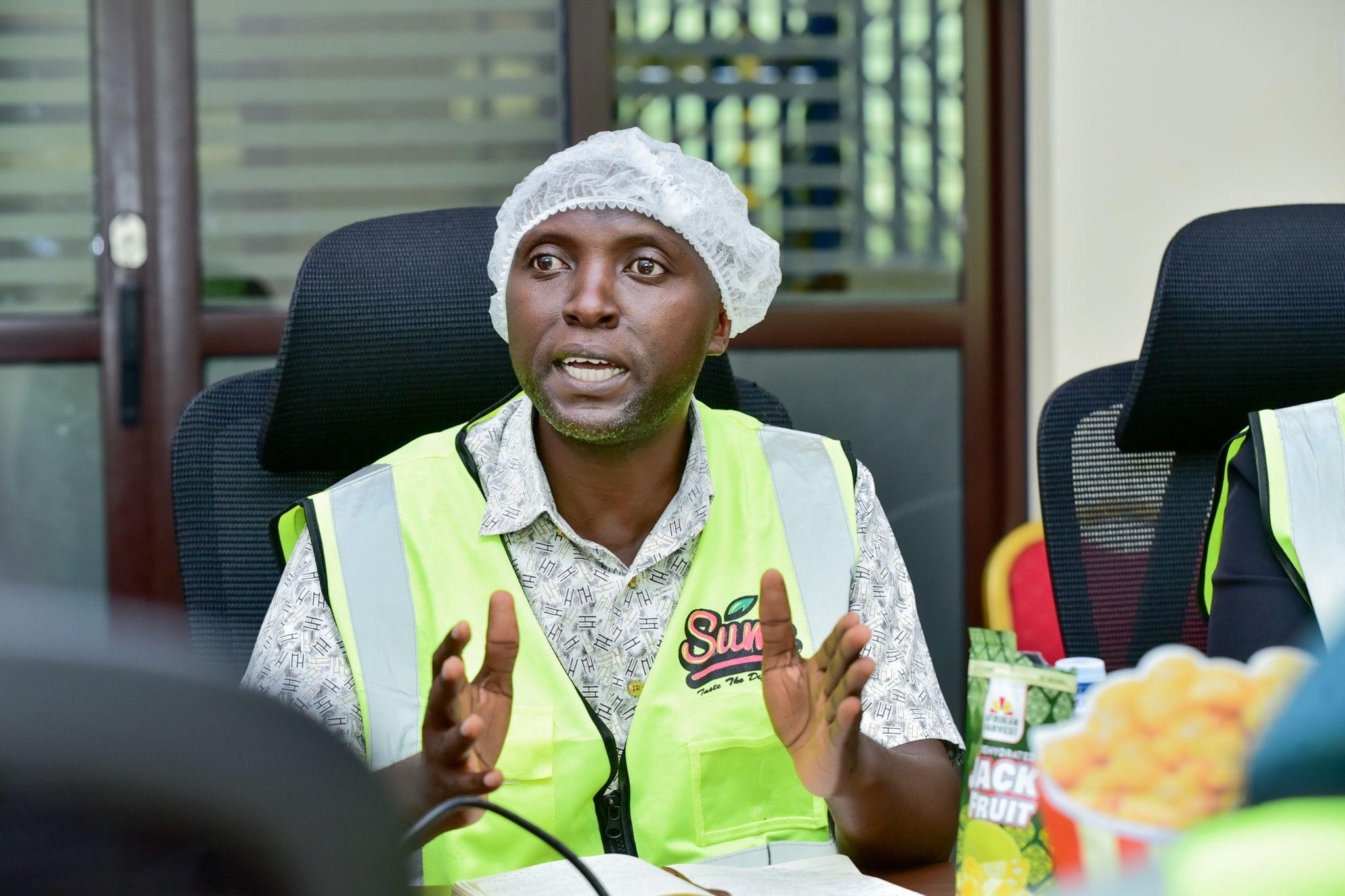
He further suggested specialised courses tailored to the factory’s needs and attachment of research students interested in manufacturing. Such collaboration would contribute to curriculum responsiveness and ensure that graduates are equipped with market-relevant competencies.
Strengthening University–Industry Linkages
The engagement reflects Makerere University’s continued commitment to strengthening partnerships that bridge knowledge generation and real-sector application.
Both institutions expressed a shared vision of building a structured, mutually beneficial collaboration that integrates research, innovation, skills development, and enterprise growth, positioning the University as a key knowledge partner in Uganda’s manufacturing transformation.
Discussions remain ongoing as both parties refine priority areas for formalisation.
Caroline Kainomugisha is the Communications Officer, Advancement Office.
General
Makerere University commemorates 13 transformative years of partnership with Mastercard Foundation
Published
2 days agoon
March 2, 2026
On Friday, 27th February 2026, Makerere University proudly celebrated 13 years of a significant partnership with the Mastercard Foundation, a prestigious independent organisation headquartered in Toronto, Canada. Since its inception in 2013 with the launch of the Scholars Program-currently headed by Prof. Justine Namaalwa, this collaboration has grown significantly, expanding to include two additional initiatives: The E-learning Initiative-headed by Prof. Paul Muyinda Birevu and the Africa Climate Collaborative-headed by Prof. Gorretie Nabanoga. This long-term partnership underscores the shared commitment to fostering education, innovation, and sustainability in Uganda and across Africa.
The colourful event coincided with the 76th Graduation Ceremony, during which Makerere University honoured Ms. Reeta Roy, the Founding President and CEO of the Mastercard Foundation, with an honorary Doctor of Laws.

In her commencement speech, Ms. Roy thanked Makerere University for considering a partnership with the Mastercard Foundation and for conferring upon her a prestigious honorary award.
“Mastercard Foundation is honoured to collaborate with this esteemed university, and I appreciate the recognition through this award. I am excited to be associated with Makerere University and look forward to actively embodying its values. Joining the broader community of alumni from this distinguished institution is a privilege, and I am eager to contribute to its legacy,” stated Ms. Roy.

During the reception in honour of Ms. Roy, the Chairperson of Makerere University Council, Dr. Lorna Magara, acknowledged the invaluable support from the Mastercard Foundation. She emphasised the profound impact of the Foundation’s various initiatives, particularly the scholarships for disadvantaged youth, which enable them to access higher education and opportunities that might have otherwise been beyond their reach.
“On behalf of the Makerere University Council and the broader University community, I extend our sincere gratitude to Mastercard Foundation for its commitment to collaborating with Makerere University in various endeavours, especially for providing scholarships to our underprivileged young people who would never have stepped inside a lecture room at the University.” Dr. Magara stated.

Dr. Magara, in a special way, thanked Ms. Roy for her transformative leadership and unwavering commitment to supporting young people in Africa, citing her efforts to ensure young people get their voices heard.
“As a university, our business is with young people. We are therefore committed to providing the environment and education that deliver meaningful pathways. We will provide an environment that ensures young people have a voice and agency to create meaningful change in society.” Dr. Magara pledged.

Dr. Magara further congratulated Ms. Roy on her honorary Doctor of Laws from Makerere University, noting that it is the university’s highest honour for individuals who have excelled in their careers.
“On behalf of the Makerere University community, I would like to extend my heartfelt congratulations on your honorary Doctor of Laws. This esteemed recognition represents the highest honour our institution can bestow on individuals who have demonstrated exceptional achievement and excellence across various facets of their career.” Dr. Magara remarked.
Prof. Justine Namaalwa, the Program Director of the Mastercard Foundation Scholars Program and the Coordinator for all Mastercard Foundation Initiatives at Makerere University, expressed her appreciation for the thirteen-year collaboration between Makerere University and the Mastercard Foundation. She highlighted that the partnership had yielded significant, impactful results.

“In 2013, Makerere University partnered with the Mastercard Foundation to educate the next generation of transformative African leaders who can positively impact their lives, their communities, and the economies of Africa. The partnership has had a significant impact. I thank the University Management and the Foundation team for this visionary collaboration,” remarked Prof. Namaalwa.
Prof. Namaalwa articulated that the partnership with the Mastercard Foundation is primarily focused on empowering young people as agents of change for transformational leadership in Africa. She presented compelling statistics demonstrating the positive impact of the scholars’ program, highlighting the success of individuals who have completed their education and their subsequent professional experiences after university graduation.

“This partnership focuses on young people, aiming to create positive change in their lives. To date, the Scholars Program has graduated 974 alumni, with 48% securing formal employment, 18% starting their own businesses, 8% participating in internships, and 5% pursuing further education. Overall, 72% of Scholar alumni are actively engaged in employment or entrepreneurship,” Prof. Namaalwa stated.
The colourful event showcased a dynamic array of activities that highlighted the entrepreneurial spirit of Scholars and alumni from the Mastercard Foundation at Makerere University. Attendees enjoyed a mini-exhibition featuring innovative products from these ventures.

A video documentary illustrated the positive impact of the three Mastercard Foundation initiatives. The event also featured inspiring poetry recitations by Scholars and a lively atmosphere of music and dance, creating an engaging and memorable experience for all participants.
The high-level event was attended by senior University officials, led by the Chairperson of Council, Dr. Lorna Magara; the Vice-Chancellor, Prof. Barnabas Nawangwe; the Vice-Chancellor, Academic Affairs, Prof. Sarah Ssali, Deputy, and the Ag. Deputy Vice-Chancellor, Finance and Administration Prof. Winston Tumps Ireeta. Mr Yusuf Kiranda, the University Secretary; and Prof. Buyinza Mukadasi, the Academic Registrar, Chancellor Emeritus-Prof. Ezra Suruma, former Chairperson of the Steering Committee of Mastercard Foundation Scholars Program-Prof. Umar Kakumba, and the Deputy Executive Secretary, RUFORUM, and former Program Coordinator of the Scholars Program at Makerere University-Dr. Florence Nakayiwa, among many other officials graced the function.

The event was also graced by a high-level delegation from the Mastercard Foundation, led by Ms. Reeta Roy, the Founding President of the Foundation, and included the Mastercard Foundation Teams from the Country offices in Kigali, Nairobi, and Kampala; the Program partners; the Mentors, Scholars and alumni; as well as the Program staff of the three Mastercard Foundation Initiatives at Makerere University.
At the end of the event, Makerere University honoured Ms. Reeta Roy with University memorabilia, including a pencil-drawn portrait, a pencil-drawn photo of the Ivory Tower, and other Ugandan crafts. Ms. Roy cut a graduation cake together with the 10 graduates of the 76th graduation ceremony from the Mastercard Foundation Scholars Program.
Bernard Buteera is the Principal Public Relations Officer for the Mastercard Foundation Scholars Program at Makerere University.

It is with great pleasure that I welcome you to this edition of Mak News Magazine, a publication that continues to chronicle Makerere University’s journey as a centre of academic excellence, innovation, and societal transformation.
The stories featured in this issue vividly demonstrate Makerere’s unwavering commitment to addressing national, regional, and global challenges through research, partnerships, and people-centred solutions. They reflect a university that is deeply engaged with society, one that applies knowledge not only to advance scholarship, but also to improve lives.
A recurring theme in this edition is innovation for resilience and inclusion. From the College of Agricultural and Environmental Sciences’ Healthy Soy Initiative combating child malnutrition amid climate change, to the cutting-edge work of CEDAT’s Team Green Minds integrating IoT into agriculture, Makerere continues to harness science and technology to respond to pressing development needs. Equally inspiring is the College of Natural Sciences’ success in securing international funding to scale up fish processing technologies, with a deliberate focus on empowering women and strengthening livelihoods.
This issue also highlights Makerere’s growing role in advancing health and wellbeing. The launch of the Early Intervention Psychiatry Services Clinic at Makerere University Hospital marks an important step in strengthening mental health services, while the Hospital’s transformation from a modest sickbay into a centre of excellence stands as a testament to decades of strategic investment, dedication, and service to the nation.
Our commitment to education access and global engagement is equally evident. Strategic partnerships, such as that between the College of Education and External Studies and the Uganda Vocational and Technical Assessment Board, are expanding pathways to quality education. The establishment of the first-ever United States Studies Centre in the Great Lakes Region positions Makerere as a hub for dialogue, research, and policy engagement on global affairs. We also celebrate our vibrant international community, with graduates drawn from 67 nationalities—affirming Makerere’s status as a truly global university.
This edition further showcases initiatives that ensure long-term institutional sustainability, including the launch of the CoCIS Endowment Fund, infrastructure developments such as the modern hostel at Buyana Farm, and transformative programmes supported by the Mastercard Foundation that continue to empower young people across the continent.
As you read through these pages, I invite you to reflect on the collective effort of our students, staff, alumni, partners, and supporters whose contributions make these achievements possible. Together, we continue to shape Makerere University as a place where knowledge serves humanity.
I wish you an engaging and inspiring read.
Prof. Barnabas Nawangwe
VICE CHANCELLOR
Trending
-

 Humanities & Social Sciences1 week ago
Humanities & Social Sciences1 week agoMeet Najjuka Whitney, The Girl Who Missed Law and Found Her Voice
-

 General1 week ago
General1 week ago76th Graduation Highlights
-

 Agriculture & Environment2 weeks ago
Agriculture & Environment2 weeks agoUganda Martyrs Namugongo Students Turn Organic Waste into Soap in an Innovative School Project on Sustainable Waste Management
-

 Health2 weeks ago
Health2 weeks agoMakerere University School of Public Health Graduates First Cohort of Cost-Effectiveness Analysis Short Course
-

 Agriculture & Environment1 week ago
Agriculture & Environment1 week agoCAES Presents Overall Best Performing Student in the Sciences & a Record 28 PhDs at the 76th Graduation Ceremony
